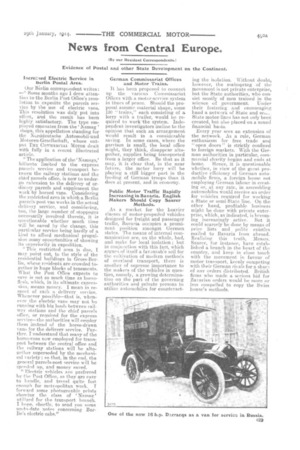News from Central Europe.
Page 23

If you've noticed an error in this article please click here to report it so we can fix it.
(By our Resident Correspondents.)
Evidence of Postal and other State Development on. the Continent.
IncrezIsed Electric Service in iberlin Postal Area.
Our B7erlin correspondent writes : —" Some months ago I drew attention to the Berlin Post Office's resolution to expedite the parcels service by the use of electric vans. This resolution was duly put into effect, and the result has been _highly satisfactory. The type employed emanates from the iNamag ' shops, this appellation standing for the Norddeutsche Automobil-und Motoren-Gesellschaft, whose output Thu COMMERCiAL MOTOR dealt with fully in a recent illustrated article.
"The application of the Namags,' hitherto limited to the express parcels service and transport between the railway stationsand the chief parcels office, is now to undergo extension to the delivery of ordinary-parcels and supplement the work by horsed vans. Considering the restricted area in which a Berlin parcels-post van works in the actual delivery service, and considering, Too, the large number of stoppages necessarily involved therein, it is questionable whether much time will be saved by the change, this particular service being hardly of a kind to afford mechanical propulsion many opportunities of showing its superiority in expedition.
" This restricted area is due, I may point out, to the style of the residential buildings in Gross-Berlin, whose residents are crowded together in huge blocks of tenements. What the Post Office expects to save is not so much time as horseflesh, which, in its ultimate expression, means money. I mean in respect of such a delivery service. Whenever possible—that is, whenever the electric vans may not be running with big loads between railway stations and the chief parcels office, or required for the express service—the authorities will employ them instead of the horse-drawn vans for the delivery service. Further. I understand that many of the horse-vans now employed for transport, between the central office and the railway stations will he alto..t,ether superseded by the mechanical variety ; so that, in the end, the general parcels-post service will be speeded up, and money saved.
" Electric vehicles a-re preferred by the Post Office, as they are easy to handle, and travel quite fast enough for metropolitan work. forward some photographic prints showing the class of Nama.g utilized for the transport branch. I hope, shortly, to send you some up-to-date notes concerning Berlin's electric cabs." German Commissariat Offices and Motor Trains.
It has been proposed to connect up the various Commissariat Offices with a motor-service system. in times of peace. Should the proposal assume material shape, some 130 " trains," each consisting of a lorry with a trailer, would be required to work-the system. Independent investigators incline to the opinion that such an arrangement would result in a considerable saving. In some cases, where the garrison is small, the local office might, they think, disappear altogether, supplies being transported from a larger office. Be that as it may, it is clear that, in the near future, the motor lorry will be playing a still bigger part in the feeding of German troops than it does at present, and in economy.
Public Motor Traffic Rapidly Increasing in Bavaria. English Makers Should Copy Saurer Methods.
As a market for the heavier classes of motor-propeiled vehicles designed for freight and passenger traffic, Bavaria occupies a prominent position amongst German states. The means of internal communication are. OIL the whole, bad, and make for local isolation ; but in conjunction with this fact, which argues of itself a favourable soil for the cultivation of modE.,rn methods of overland transport, there is another of supreme importance to the makers of the vehicles in question, namely, a growing determination on the part of the governing authorities and private persons to utilize automobiles for counteract ing the isolation. Without doubt, however, the mainspring . of the movement is not private enterprise, but the State authorities, who consist mostly of men trained in the science of government. Tinder their fostering and encotragieg hand a network of State and seo._ State motor-lines has not only been created, but also placed -on a sound financial basis.
Every year secs an extension of the network. As a rule, German enthusiasm for free trade and "open doors" is strictly confined to foreign markets, With the German authorities in particular, commercial charity begins and ends at home. Hence, it, is questionable whether, in view of the great productive efficiency of German automobile firms, a foreign house not employing German labour in creating or, at any rate, in assembling automobiles would receive an order for vehicles required for working a State or semi-State line. On the other hand, profitable business might be done with private enterprise, which, as indicated, is becoming increasingly active. But it °mad scarcely be done by means of price lists and polite epistles mailed to Bavaria from abroad. Realizing this truth, Messrs. Sourer, for instance, have established a branch in the heart of the country, and keep in close touch with the movement in favour of motor transport, keenly competing with their German rivals for a share of any orders distributed. British firms who made a serious bid for Lavarian orders would be more or less compelled to copy the S.wisa house's methods.






































